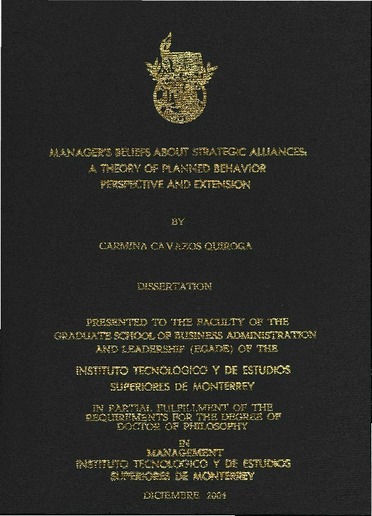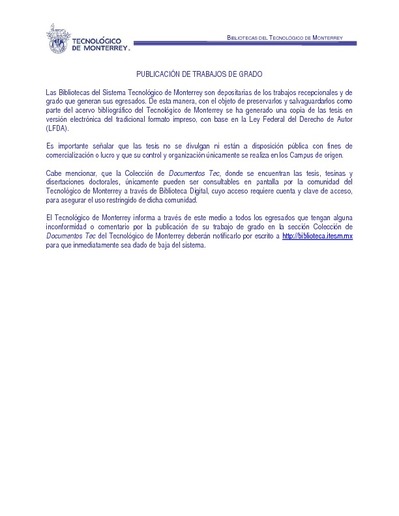| dc.contributor | Varadarajan, P. Rajan | |
| dc.contributor | Gomez, Irma | |
| dc.contributor | Yadav, Manjit | |
| dc.contributor | Ibarra, Alejandro | |
| dc.contributor.author | Cavazos Quiroga, Carmina | |
| dc.creator | CAVAZOS QUIROGA, CARMINA; 122848 | es_MX |
| dc.date.accessioned | 2015-08-17T11:36:30Z | en |
| dc.date.available | 2015-08-17T11:36:30Z | en |
| dc.date.issued | 2004-12-01 | |
| dc.identifier.uri | http://hdl.handle.net/11285/572611 | en |
| dc.description.abstract | The purpose of this dissertation was to investigate how manager's attitudes toward, subjective norm about and perceived behavioral control over entering into strategic alliances, and the moderating role of manager's experience influence the manager's intention to enter into strategic alliances on behalf of his/her firm over the next two years. The research focus and specific research objectives were guided by a review of the relevant literature that revealed: (1) the identification of the marketing manager's important role in the implementation of the organization's strategy; (2) the need to investigate the psychological factors and cognitive structure of the marketing manager in order to fully assess his/her intentions to support entry of the firm into strategic alliances; and (3) the validation of the theory of planned behavior by incorporating experience in the model. iv This study attempted to close these gaps in prior research by investigating the role of manager's attitude toward, subjective norm about and perceived behavioral control over entering into strategic alliances and the use of manager's experience as a moderator of the relationship between manager's attitudes about, subjective norm toward and perceived behavioral control over and manager's intentions. Data was collected from marketing managers of 5 industries and subgroup analysis using multiple regression was used to test the conceptual model. Results indicate that marketing managers less experienced in strategic alliances tend to follow their attitudes about strategic alliances instead of their subjective norms. For managers more experienced in strategic alliances, results show that they tend to follow their subjective norms about entering into strategic alliances instead of their attitudes. A possible explanation can be found in the Institutional Theory of Organizations. Institutional theory (DiMaggio and Powell 1983) predicts that organizations seek to follow similar patterns of behavior based on their desire to reconcile to norms and their quest for legitimacy. Firms try to bargain with their reality by the adoption and use of institutionalized responses. As a result, this adoption helps the manager to deal with his/her perceived uncertainty by creating processes that make organizations more similar. | |
| dc.format.medium | Texto | es_MX |
| dc.language.iso | eng | |
| dc.publisher | Instituto Tecnológico y de Estudios Superiores de Monterrey | |
| dc.relation.isFormatOf | versión publicada | es_MX |
| dc.relation.isreferencedby | REPOSITORIO NACIONAL CONACYT | |
| dc.rights | openAccess | |
| dc.rights | openAccess | |
| dc.rights.uri | http://creativecommons.org/licenses/by-nc-nd/4.0 | * |
| dc.subject.classification | HUMANIDADES Y CIENCIAS DE LA CONDUCTA; PSICOLOGÍA; PSICOLOGÍA SOCIAL; PROCESOS DE GRUPOS | es_MX |
| dc.subject.lcsh | Ciencias Sociales / Social Sciences | |
| dc.subject.lcsh | Theory and practice of education--Higher education—Preparation of theses | es_MX |
| dc.title | Manager's beliefs about strategic alliances: a theory of planned behavior perspective and extension | |
| dc.type | Tesis Doctorado / doctoral Thesis | |
| thesis.degree.level | Doctor of Philosophy | en |
| thesis.degree.discipline | EGADE Business School | en |
| thesis.degree.name | Doctoral Program in Management | en |
| dc.subject.keyword | Manager Beliefs and Attitudes | |
| dc.subject.keyword | Strategic Alliances | |
| dc.subject.keyword | Psychological factors | |
| dc.subject.keyword | Structure of the Marketing | |
| thesis.degree.program | Campus Monterrey | en |
| dc.audience.educationlevel | Investigadores/Researchers | |
| refterms.dateFOA | 2018-03-18T04:49:15Z | |
| refterms.dateFOA | 2018-03-18T04:49:15Z | |
| dc.identificator | 4 | |
| dc.identificator | 61 | |
| dc.identificator | 6114 | |
| dc.identificator | 611411 | |


